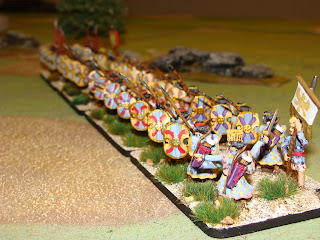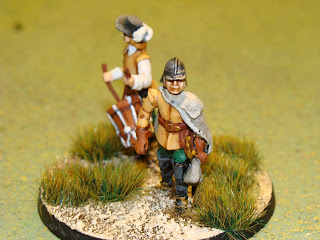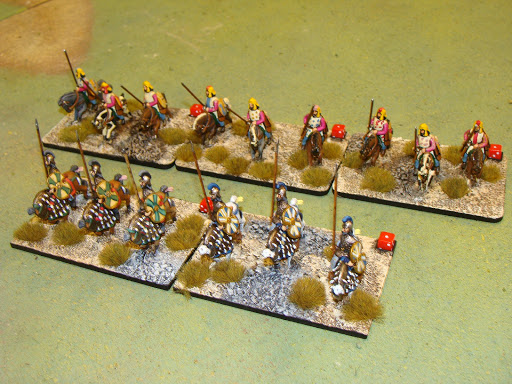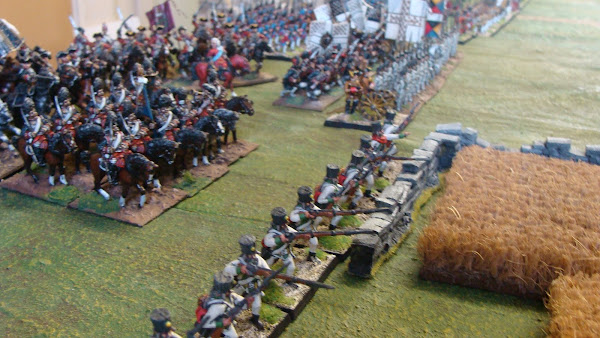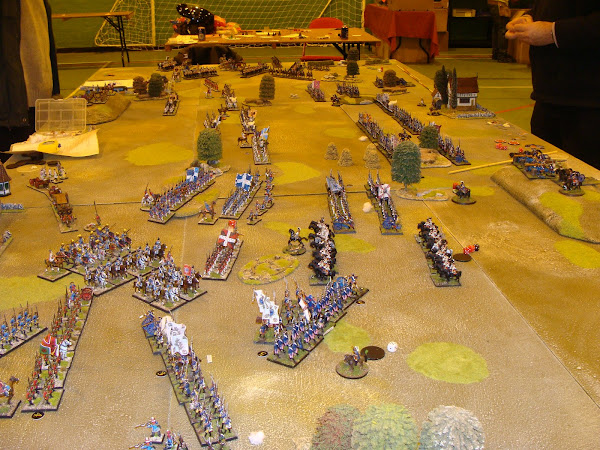I suppose it was inevitable given the current crazed atmosphere in the western world that some worthy would produce a piece in one of our wargaming magazines regarding, our perception of history, stereotypes and inclusivity.
The piece in question is in issue 110 of Wargames, Soldiers and Strategy written by a gentleman called David Hiscocks and titled Challenging Historical Stereotypes. Before I start I will stress I don't know this chap,have no axe to grind against him and he is entitled to holding a viewpoint etc etc, however I do have a few views of my own re the article and why it was written.
If one reads the article it seems on the face of it a well written piece regarding how its important that our historical wargames are based in fact. I am all for that and despair at the paucity of knowledge that some wargamers show regarding their latest army.
What I find tedious is the inevitable tick boxing that he displays from his opening paragraph re the ''sheer variety of people of all beliefs?? cultures and backgrounds from all over the World who I have met through this hobby.''
Really?
I know some wargamers from Westerhope near the wilds of Newcastle and they inhabit what I see as an alien culture but apart from them, I havent wargamed with many Buddhists or members of the Hare Krishna group. Inclusivity is one of the stock words that has been imposed upon the world.
If we aren't inclusive then we are clearly not very nice and must work harder at making certain all peoples and sexual orientation are encouraged to play with toy soldiers, even though the vast majority of the Worlds population really aren't interested in our hobby and frankly wouldnt be seen dead anywhere near the people who inhabit our firmament. Why would they?
It isn't that we discourage these billions. They simply have better things to do with their time. Admit it, we are part of a niche hobby viewed by outsiders who know of us as a bit 'strange' at the very least and as 'warmongers' as one women wrote about me last year. I actually took that as a complement to be honest by the way. But I have always found wargamers very welcoming, perhaps too welcoming sometimes.A bit like the staff in a Games Workshop shop.
Apparently David's group have been exploring the issues caused by a reliance on national characteristics in wargames and of playing games based in the context of morally questionable events. They sound a fun group and very worthy but it is many many years since I discussed the infamous concept of National Characteristics.
Remember Joseph Morshauser and Bruce Quarrie? I possess both authors book's and treasure them, but I remember the arguments re the fighting capabilities of various Napoleonic armies and why Napoleon's Polish allies were better fighters than the poor Spanish in the wargaming press etc and it was very pointless back then. It was only later did one realise that it was all bollocks and that no nation possessed super troops but that in some instances they were better trained, equipped, motivated etc and it had very little to do with where they were born or what colour their skin was.
Back then it was an attempt to add detail to the wargame where once we had simply rolled a dice and knocked figures over. Now its apparently a social crime to declare that a Spanish enlisted man didnt want to fight whilst the Pole was motivated by the hope of an independent country. Apparently using stereotypes is akin to being,... that over used word a racist.
Mr. Hiscocks provides us with an example of stereotyping; apparently in the second world war the Italians were viewed as surrender monkeys and the Waffen SS as effectively supermen dressed in cool uniforms by wargamers. [I hope he has never read a Commando comic.]
One talks of stereotypes but I defy him to find many tankies who doesnt recognise the individual bravery of the poor Italian grunt or that the Waffen SS were made up of a lot of disparate groups of misfits fit only for murder and other war-crimes. He talks of wargamers making generalisations but then commits the same crime by claiming that we still believe the propaganda that was generated during the actual conflict!
Inevitably given the current discussions on the web regarding our 'heros' he mentions how Churchill had paid tribute to the heroism of our Imperial Indian troops and claims that such praise is used to justify the fighting qualities of these troop types in wargaming. I think he must be talking of the Flames of War rule-books but I may be wrong.
Of course he has to drift into politics by claiming that Churchill et-al also held offensive beliefs which lie at the root of such quotes! Perhaps it never occurred to David that Churchill was simply praising a group of brave men who stood beside us when others from the sub continent were attempting to break away and ally themselves with the Japanese. But no, Churchill must be tagged as a possessor of offensive views and dont forget he believed in the empire and its benefits for our subjects so is guilty as charged.
He goes on to make the point that wargamers need to develop rules based on training? or fighting doctrine and apply them where relevant. Well good luck with that idea because what's written in a training manual is only relevant until the bullets fly and then it all goes out of the window.
He makes a good point that wargamers should seek to understand why troops fought differently, but he clearly doesn't see that this has little to do with stereotypes but simply researching the history of a campaign, general etc and attempting to form a balanced view regarding why one side lost and the other won.
In this day and age Colonialism is viewed as repugnant apparently and of course to wargame that period in history is morally so. Naturally this causes Mr Hiscock to agonize over this issue and as he writes;
'' A problematic element peculiar to colonial wargaming is the risk of perpetuating Nineteenth century Imperial attitudes that are now rightly deemed offensive, such as expressed by Rudyard Kipling's Fuzzy Wuzzy.'' [Reaches for the smelling salts and sobs into his cashmere jumper.]
It was inevitable that Kipling would get a mention as he seems to be the go to arch villain of the woke brigade. I assume he has read the poem but somehow has managed to miss the whole point of Kipling's poems which were to show the bravery and pathos of the ordinary soldier and his opponents.
They had very little to do with extolling the virtues of the Imperial dream and more to do with displaying the good humour of the average British Tommy who was attempting to survive in a hostile and dangerous environment. [More stereotyping I assume] but of course a little knowledge is a dangerous thing but where Kipling is concerned I am very protective of this national treasure.
David ploughs on arguing that people like Kipling created an image used by wargamers whereby the natives were mere cannon fodder for the Imperial hordes, when the reality was something far different.
To help the reader make up their own mind I recommend that they read the poem and I attach the opening verse;
We've fought with many men acrost the seas,An' some of 'em was brave an' some was not:The Paythan an' the Zulu an' Burmese;But the Fuzzy was the finest o' the lot.We never got a ha'porth's change of 'im:'E squatted in the scrub an' 'ocked our 'orses,'E cut our sentries up at Sua~kim~,An' 'e played the cat an' banjo with our forces.So 'ere's ~to~ you, Fuzzy-Wuzzy, at your 'ome in the Soudan;You're a pore benighted 'eathen but a first-class fightin' man;We gives you your certificate, an' if you want it signedWe'll come an' 'ave a romp with you whenever you're inclined.
One can see how it drips with Imperial arrogance and how the myth of the poor native was perpetuated by the wargamer of such a morally repugnant period.
He goes on to describe that through his research he had discovered that the Fuzzy Wuzzies had actually been equipped with modern weaponry and as a consequence using this knowledge coupled to period appropriate tactics? and fieldcraft [they sound like latter day scouts] they can out manoeuvre the clumsy Imperial opponents [stereotypical view anyone?]
He finishes his piece with the conclusion that by understanding our history and ignoring stereotypes we can better understand our shared martial history which is fine, of course he then spoils it by adding,
''while this does not make these events palatable it will ensure that we are not accidentally risking projecting outdated ideas into our games in the name of entertainment.'' [God forbid that should happen.]
Conclusion;
So what have I learned from the two pages in the WSS?
1] As I have advocated for many years, wargamers need to know their subject and read books and then read more books to understand the armies they are using. Its not rocket science but for some it is becoming an issue.
2] All war is morally repugnant but unfortunately is such a fascinating subject crammed full of wonderful people, monsters, acts of heroism and acts of stupidity that it needs to be studied, understood and yes used as a means of entertainment, as long as no one gets hurt.
3] That some educated wargamers need to get a life and perhaps question why they wargame in the first place. If they feel so strongly about historical games then perhaps they should consider the new range of uniformed rabbits that have sprung up on the wargaming firmament. They seem fairly innocuous.
4] That slowly but surely certain woke individuals are turning their thoughts towards the poor wargamer and his outdated views. I proudly admit that I am out of step with these modern attitudes and will also admit I see the hobby as a wonderful way to spend a few hours without thinking one jot about the opponents figures I am attempting to massacre. I will however refuse to ever apologise for my love of such a hobby and I suffered years of this crap when I was gainfully employed so being a contrary so and so will poke at the pomposity of individuals who feel we need to be more.... 'woke' as it were.
And finally...........
5] That the author should steer clear of the wonderful wargaming rules written by that arch Imperialist, Howard Whitehouse.

